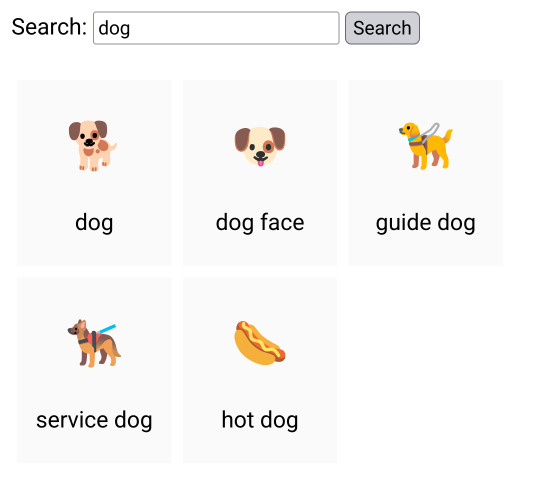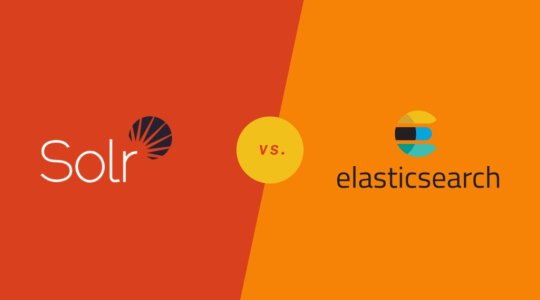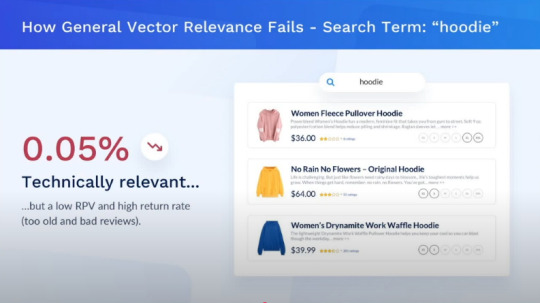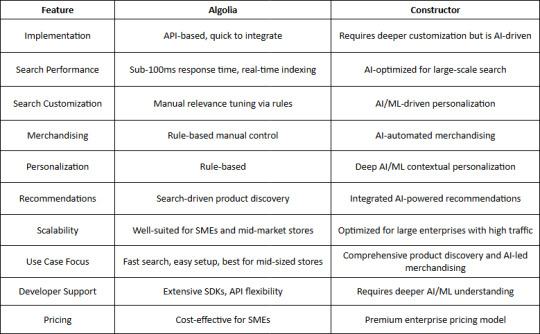#solr search
Explore tagged Tumblr posts
Text
#solr#solr search#search#algorithm#technology#how it works#google search#google#trending#blog#newsletter
0 notes
Text
https://prosperasoft.com/solr_lucene.html
#Outsource Solr Search Solutions#hire Solr developers#Lucene outsourcing#DTSearch experts#enterprise search solutions#indexing optimization
0 notes
Text
Setting Up Apache Solr with Search API Solr on Ubuntu in Lando for Drupal
Looking to improve your Drupal site's search performance? This step-by-step guide shows you how to set up Apache Solr on Ubuntu and integrate it with Drupal's Search API.

0 notes
Text
Needed an easy way for me to get at emojis on non mobile devices for some user manual work so I used lunr
and unicode-emoji-json
and made an emoji search engine in under 2 hours

74 notes
·
View notes
Text
What is Solr – Comparing Apache Solr vs. Elasticsearch

In the world of search engines and data retrieval systems, Apache Solr and Elasticsearch are two prominent contenders, each with its strengths and unique capabilities. These open-source, distributed search platforms play a crucial role in empowering organizations to harness the power of big data and deliver relevant search results efficiently. In this blog, we will delve into the fundamentals of Solr and Elasticsearch, highlighting their key features and comparing their functionalities. Whether you're a developer, data analyst, or IT professional, understanding the differences between Solr and Elasticsearch will help you make informed decisions to meet your specific search and data management needs.
Overview of Apache Solr
Apache Solr is a search platform built on top of the Apache Lucene library, known for its robust indexing and full-text search capabilities. It is written in Java and designed to handle large-scale search and data retrieval tasks. Solr follows a RESTful API approach, making it easy to integrate with different programming languages and frameworks. It offers a rich set of features, including faceted search, hit highlighting, spell checking, and geospatial search, making it a versatile solution for various use cases.
Overview of Elasticsearch
Elasticsearch, also based on Apache Lucene, is a distributed search engine that stands out for its real-time data indexing and analytics capabilities. It is known for its scalability and speed, making it an ideal choice for applications that require near-instantaneous search results. Elasticsearch provides a simple RESTful API, enabling developers to perform complex searches effortlessly. Moreover, it offers support for data visualization through its integration with Kibana, making it a popular choice for log analysis, application monitoring, and other data-driven use cases.
Comparing Solr and Elasticsearch
Data Handling and Indexing
Both Solr and Elasticsearch are proficient at handling large volumes of data and offer excellent indexing capabilities. Solr uses XML and JSON formats for data indexing, while Elasticsearch relies on JSON, which is generally considered more human-readable and easier to work with. Elasticsearch's dynamic mapping feature allows it to automatically infer data types during indexing, streamlining the process further.
Querying and Searching
Both platforms support complex search queries, but Elasticsearch is often regarded as more developer-friendly due to its clean and straightforward API. Elasticsearch's support for nested queries and aggregations simplifies the process of retrieving and analyzing data. On the other hand, Solr provides a range of query parsers, allowing developers to choose between traditional and advanced syntax options based on their preference and familiarity.
Scalability and Performance
Elasticsearch is designed with scalability in mind from the ground up, making it relatively easier to scale horizontally by adding more nodes to the cluster. It excels in real-time search and analytics scenarios, making it a top choice for applications with dynamic data streams. Solr, while also scalable, may require more effort for horizontal scaling compared to Elasticsearch.
Community and Ecosystem
Both Solr and Elasticsearch boast active and vibrant open-source communities. Solr has been around longer and, therefore, has a more extensive user base and established ecosystem. Elasticsearch, however, has gained significant momentum over the years, supported by the Elastic Stack, which includes Kibana for data visualization and Beats for data shipping.
Document-Based vs. Schema-Free
Solr follows a document-based approach, where data is organized into fields and requires a predefined schema. While this provides better control over data, it may become restrictive when dealing with dynamic or constantly evolving data structures. Elasticsearch, being schema-free, allows for more flexible data handling, making it more suitable for projects with varying data structures.
Conclusion
In summary, Apache Solr and Elasticsearch are both powerful search platforms, each excelling in specific scenarios. Solr's robustness and established ecosystem make it a reliable choice for traditional search applications, while Elasticsearch's real-time capabilities and seamless integration with the Elastic Stack are perfect for modern data-driven projects. Choosing between the two depends on your specific requirements, data complexity, and preferred development style. Regardless of your decision, both Solr and Elasticsearch can supercharge your search and analytics endeavors, bringing efficiency and relevance to your data retrieval processes.
Whether you opt for Solr, Elasticsearch, or a combination of both, the future of search and data exploration remains bright, with technology continually evolving to meet the needs of next-generation applications.
2 notes
·
View notes
Text
Apache Solr for TYPO3: Advanced Search Features for Your TYPO3 Website
Have you ever used a search bar on a website only to find results that are slow, confusing, or irrelevant? It can be really frustrating, especially when you're in a hurry to find important information. This problem happens to many TYPO3 websites because the basic built-in search often isn't powerful enough. Fortunately, Apache Solr for TYPO3 provides an excellent solution to make your search faster, smarter, and easier for all users.

What is Apache Solr?
Apache Solr is a free, open-source search engine platform designed to handle large amounts of data quickly and efficiently. It’s built on Apache Lucene, a robust search technology, and is widely used because of its speed and reliability. Solr indexes your website’s content effectively, allowing visitors to find exactly what they're looking for in seconds.
Main Features of Apache Solr
Apache Solr offers several powerful features to enhance your website's search capability:
Fast Results: Delivers instant search results, even for large websites with thousands of pages.
Faceted Search: Enables users to narrow down search results by using filters such as categories, tags, or dates.
Autocomplete and Spell-Checking: Offers suggestions as users type and corrects minor spelling errors automatically.
Synonym Support: Understands and matches similar words, ensuring accurate results even if users use different terms.
Document Indexing: Allows users to search within documents like PDFs, Word files, and Excel sheets, not just webpage text.
Why Apache Solr is Essential for TYPO3 Websites
The default TYPO3 search is limited and slow, particularly as your site grows. Apache Solr solves this by providing:
Enhanced Speed: Quickly searches large amounts of content without slowing down your site.
Better User Experience: Provides users with clear, relevant results, encouraging them to stay longer on your site.
Customization Options: Easily tailor the search functionality to your specific website needs, ensuring relevant results every time.
Scalability: Handles growth efficiently, making it perfect for websites that continue to add content.
Easy Setup and Useful Extensions
Setting up Apache Solr on your TYPO3 site is straightforward:
Install the Solr Extension: Use the TYPO3 backend or Composer to install the EXT:solr extension.
Configure Your Site: Adjust simple settings using TypoScript and ensure proper indexing by adding markers around your content.
Regularly Update Indexes: Schedule automatic content indexing via TYPO3's scheduler to keep your search updated.
TYPO3 also provides helpful extensions to make your setup easier:
EXT:solr: The core extension linking TYPO3 with Apache Solr, enabling all advanced search functionalities.
solr file_indexer: Helps index file contents so users can search inside documents.
DDEV Apache Solr for TYPO3: A development tool to easily set up and test Solr locally.
Benefits of Implementing Apache Solr
By integrating Apache Solr into your TYPO3 website, you gain:
Improved Site Engagement: Visitors stay longer as they easily find what they need.
Increased Efficiency: Reduces the effort needed to find important information, benefiting both users and administrators.
Professional Search Experience: Gives your website a polished, professional feel, enhancing user trust and satisfaction.
Conclusion
Apache Solr significantly upgrades your TYPO3 site's search capability, providing fast, accurate, and user-friendly results. It's easy to set up, customize, and maintain, making it a valuable tool for improving your website’s performance. Start using Apache Solr today to enhance the search experience for your users and watch your website engagement grow!
#TYPO3#ApacheSolr#WebsiteSearch#SiteOptimization#ContentDiscovery#FastSearch#SearchSolutions#OpenSourceTools#AdvancedSearch#TYPO3Solr
0 notes
Text
7 Benefits of Using Search Engine Tools for Data Analysis

We often think of search engines as tools for finding cat videos or answering trivia. But beneath the surface, they possess powerful capabilities that can significantly benefit data science workflows. Let's explore seven often-overlooked advantages of using search engine tools for data analysis.
1. Instant Data Exploration and Ingestion:
Imagine receiving a new, unfamiliar dataset. Instead of wrestling with complex data pipelines, you can load it directly into a search engine. These tools are remarkably flexible, handling a wide range of file formats (JSON, CSV, XML, PDF, images, etc.) and accommodating diverse data structures. This allows for rapid initial analysis, even with noisy or inconsistent data.
2. Efficient Training/Test/Validation Data Generation:
Search engines can act as a cost-effective and efficient data storage and retrieval system for deep learning projects. They excel at complex joins, row/column selection, and providing Google-like access to your data, experiments, and logs, making it easy to generate the necessary data splits for model training.
3. Streamlined Data Reduction and Feature Engineering:
Modern search engines come equipped with tools for transforming diverse data types (text, numeric, categorical, spatial) into vector spaces. They also provide features for weight construction, metadata capture, value imputation, and null handling, simplifying the feature engineering process. Furthermore, their support for natural language processing, including tokenization, stemming, and word embeddings, is invaluable for text-heavy datasets.
4. Powerful Search-Driven Analytics:
Search engines are not just about retrieval; they're also about analysis. They can perform real-time scoring, aggregation, and even regression analysis on retrieved data. This enables you to quickly extract meaningful insights, identify trends, and detect anomalies, moving beyond simple data retrieval.
5. Seamless Integration with Existing Tools:
Whether you prefer the command line, Jupyter notebooks, or languages like Python, R, or Scala, search engines seamlessly integrate with your existing data science toolkit. They can output data in various formats, including CSV and JSON, ensuring compatibility with your preferred workflows.
6. Rapid Prototyping and "Good Enough" Solutions:
Search engines simplify the implementation of algorithms like k-nearest neighbors, classifiers, and recommendation engines. While they may not always provide state-of-the-art results, they offer a quick and efficient way to build "good enough" solutions for prototyping and testing, especially at scale.
7. Versatile Data Storage and Handling:
Modern search engines, particularly those powered by Lucene (like Solr and Elasticsearch), are adept at handling key-value, columnar, and mixed data storage. This versatility allows them to efficiently manage diverse data types within a single platform, eliminating the need for multiple specialized tools.
Elevate Your Data Science Skills with Xaltius Academy's Data Science and AI Program:
While search engine tools offer valuable benefits, they are just one component of a comprehensive data science skillset. Xaltius Academy's Data Science and AI program provides a robust foundation in data analysis, machine learning, and AI, empowering you to leverage these tools effectively and tackle complex data challenges.
Key benefits of the program:
Comprehensive Curriculum: Covers essential data science concepts, including data analysis, machine learning, and AI.
Hands-on Projects: Gain practical experience through real-world projects and case studies.
Expert Instruction: Learn from experienced data scientists and AI practitioners.
Focus on Applied Skills: Develop the skills needed to apply data science and AI techniques to solve real-world problems.
Career Support: Receive guidance and resources to help you launch your career in data science and AI.
Conclusion:
Search engine tools offer a surprising array of benefits for data science, from rapid data exploration to efficient model development. By incorporating these tools into your workflow and complementing them with a strong foundation in data science principles, you can unlock new levels of efficiency and insight.
0 notes
Text
Algolia vs. Connector Search Tools: A Comprehensive Comparison
Evaluating Performance, Features, and Usability to Help You Choose the Right Search Solution.
When it comes to implementing a powerful search and discovery solution for eCommerce, two major players often come up: Algolia and Constructor. While both provide advanced search capabilities, their workflows, implementations, and approach to AI-driven product discovery set them apart. This blog takes a deep dive into their differences, focusing on real-world applications, technical differentiators, and the impact on business KPIs.
Overview of Algolia and Constructor
Algolia
Founded in 2012, Algolia is a widely recognized search-as-a-service platform.
It provides instant, fast, and reliable search capabilities with an API-first approach.
Commonly used in various industries, including eCommerce, SaaS, media, and enterprise applications.
Provides keyword-based search with support for vector search and AI-driven relevance tuning.
Constructor
A newer entrant in the space, Constructor focuses exclusively on eCommerce product discovery.
Founded in 2015 and built from the ground up with clickstream-driven AI for ranking and recommendations.
Used by leading eCommerce brands like Under Armour and Home24.
Aims to optimize business KPIs like conversion rates and revenue per visitor.
Key Differences in Implementation and Workflows
1. Search Algorithm and Ranking Approach
Algolia:
Uses keyword-based search (TF-IDF, BM25) with additional AI-driven ranking enhancements.
Supports vector search, semantic search, and hybrid approaches.
Merchandisers can fine-tune relevance manually using rule-based controls.
Constructor:
Built natively on a Redis-based core rather than Solr or ElasticSearch.
Prioritizes clickstream-driven search and personalization, focusing on what users interact with.
Instead of purely keyword relevance, it optimizes for "attractiveness", ranking results based on a user’s past behavior and site-wide trends.
Merchandisers work with AI, using a human-interpretable dashboard to guide search ranking rather than overriding it.
2. Personalization & AI Capabilities
Algolia:
Offers personalization via rules and AI models that users can configure.
Uses AI for dynamic ranking adjustments but primarily relies on structured data input.
Constructor:
Focuses heavily on clickstream data, meaning every interaction—clicks, add-to-cart actions, and conversions—affects future search results.
Uses Transformer models for context-aware personalization, dynamically adjusting rankings in real-time.
AI Shopping Assistant allows for conversational product discovery, using Generative AI to enhance search experiences.
3. Use of Generative AI
Algolia:
Provides semantic search and AI-based ranking but does not have native Generative AI capabilities.
Users need to integrate third-party LLMs (Large Language Models) for AI-driven conversational search.
Constructor:
Natively integrates Generative AI to handle natural language queries, long-tail searches, and context-driven shopping experiences.
AI automatically understands customer intent—for example, searching for "I'm going camping in Yosemite with my kids" returns personalized product recommendations.
Built using AWS Bedrock and supports multiple LLMs for improved flexibility.
4. Merchandiser Control & Explainability
Algolia:
Provides rule-based tuning, allowing merchandisers to manually adjust ranking factors.
Search logic and results are transparent but require manual intervention for optimization.
Constructor:
Built to empower merchandisers with AI, allowing human-interpretable adjustments without overriding machine learning.
Black-box AI is avoided—every recommendation and ranking decision is traceable and explainable.
Attractiveness vs. Technical Relevance: Prioritizes "what users want to buy" over "what matches the search query best".
5. Proof-of-Concept & Deployment
Algolia:
Requires significant setup to run A/B tests and fine-tune ranking.
Merchandisers and developers must manually configure weighting and relevance.
Constructor:
Offers a "Proof Schedule", allowing retailers to test before committing.
Retailers install a lightweight beacon, send a product catalog, and receive an automated performance analysis.
A/B tests show expected revenue uplift, allowing data-driven decision-making before switching platforms.
Real-World Examples & Business Impact
Example 1: Searching for a Hoodie
A user searches for "hoodie" on an eCommerce website using Algolia vs. Constructor:
Algolia's Approach: Shows hoodies ranked based on keyword relevance, possibly with minor AI adjustments.

Source : YouTube - AWS Partner Network
Constructor's Approach: Learns from past user behavior, surfacing high-rated hoodies in preferred colors and styles, increasing the likelihood of conversion.

Source : YouTube - AWS Partner Network
Example 2: Conversational Search for Camping Gear
A shopper types, "I'm going camping with my preteen kids for the first time in Yosemite. What do I need?"
Algolia: Requires manual tagging and structured metadata to return relevant results.
Constructor: Uses Generative AI and Transformer models to understand the context and intent, dynamically returning the most relevant items across multiple categories.
Which One Should You Choose?

Why Choose Algolia?
Ease of Implementation – Algolia provides a quick API-based setup, making it ideal for eCommerce sites looking for a fast integration process.
Speed & Performance – With real-time indexing and instant search, Algolia is built for speed, ensuring sub-100ms response times.
Developer-Friendly – Offers extensive documentation, SDKs, and a flexible API for developers to customize search behavior.
Rule-Based Merchandising – Allows businesses to manually tweak search relevance with robust rules and business logic.
Cost-Effective for SMEs – More affordable for smaller eCommerce businesses with straightforward search needs.
Enterprise-Level Scalability – Can support growing businesses but requires manual optimization for handling massive catalogs.
Search-Driven Recommendations – While Algolia supports recommendations, they are primarily based on search behaviors rather than deep AI.
Manual Control Over Search & Merchandising – Provides businesses the flexibility to define search relevance and merchandising manually.
Strong Community & Developer Ecosystem – Large user base with extensive community support and integrations.
Why Choose Constructor?
Ease of Implementation – While requiring more initial setup, Constructor offers pre-trained AI models that optimize search without extensive manual configurations.
Speed & Performance – Uses AI-driven indexing and ranking to provide high-speed, optimized search results for large-scale retailers.
Developer-Friendly – Requires deeper AI/ML understanding but provides automation that reduces manual tuning efforts.
Automated Merchandising – AI-driven workflows reduce the need for manual intervention, optimizing conversion rates.
Optimized for Large Retailers – Designed for enterprises requiring full AI-driven control over search and discovery.
Deep AI Personalization – Unlike Algolia’s rule-based system, Constructor uses advanced AI/ML to provide contextual, personalized search experiences.
End-to-End Product Discovery – Goes beyond search, incorporating personalized recommendations, dynamic ranking, and automated merchandising.
Scalability – Built to handle massive catalogs and high traffic loads with AI-driven performance optimization.
Integrated AI-Powered Recommendations – Uses AI-driven models to surface relevant products in real-time based on user intent and behavioral signals.
Data-Driven Decision Making – AI continuously optimizes search and merchandising strategies based on real-time data insights.
Conclusion
Both Algolia and Constructor are excellent choices, but their suitability depends on your eCommerce business's needs:
If you need a general-purpose, fast search engine, Algolia is a great fit.
If your focus is on eCommerce product discovery, personalization, and revenue optimization, Constructor provides an AI-driven, clickstream-based solution designed for maximizing conversions.
With the evolution of AI and Generative AI, Constructor is positioning itself as a next-gen alternative to traditional search engines, giving eCommerce brands a new way to drive revenue through personalized product discovery.
This Blog is driven by our experience with product implementations for customers.
Connect with US
Thanks for reading Ragul's Blog! Subscribe for free to receive new posts and support my work.
1 note
·
View note
Text
Elasticsearch vs SOLR: Ultimate Search Engine Comparison
Introduction ============== Overview Choosing the right search engine for your business is a critical decision that can impact both the user experience and the backend infrastructure. In this tutorial, we will delve into the world of open-source search engines, specifically focusing on Elasticsearch and SOLR. By the end of this article, readers will be equipped with the knowledge to make an…
0 notes
Text
Drupal for government website development
This detailed discussion explains why Drupal is regarded as one of the best CMS platforms for government websites.

Drupal's strength lies in its ability to meet the unique needs of e-governance portals, which include:
Key Features of Drupal for Government Websites:
1) Security
Government websites require stringent security to protect sensitive citizen data. Drupal provides strong security features like granular user permissions, secure authentication, and regular security updates.
2) Accessibility
Compliance with WCAG and other accessibility standards is essential for government websites. Drupal includes features like semantic HTML, keyboard navigation, and screen reader compatibility to make websites accessible to all users, including those with disabilities.
3) Multilanguage Support
Many government portals need to support multiple languages. Drupal excels with its robust multilingual capabilities, making it easy to manage content in different languages.
4) Scalability
Government sites must handle high traffic volumes, especially in crises. Drupal's modular architecture supports horizontal and vertical scaling, ensuring smooth performance under heavy loads.
5) Customization and Flexibility
Drupal allows extensive customization, enabling agencies to adapt the website to their specific needs, with its modular structure and a large ecosystem of modules and themes.
6) Interoperability
Government websites often need to integrate with external systems, databases, and services. Drupal's RESTful API and flexible integration capabilities make this easy.
7) Content Management and Workflow
With customizable content types, revision control, and workflow management tools, Drupal helps agencies manage diverse content and streamline approval processes.
8) Search Functionality
Citizens must easily find information, so Drupal's powerful built-in search features, with options to integrate external engines like Apache Solr or Elasticsearch, enhance search capabilities.
9) Data Visualization and Reporting
Governments can present complex data through Drupal’s visualization tools and integrate third-party analytics for usage reporting.
10) Compliance with Regulatory Standards
Drupal supports compliance with regulatory frameworks like GDPR, HIPAA, and Section 508, essential for government data privacy and accessibility standards.
11) Integration with Government Systems
Drupal's API and modular architecture allow seamless integration with existing government systems such as CRMs and document management systems.
12) Mobile Responsiveness
Drupal ensures that government websites are mobile-friendly with responsive design out of the box.
Why Drupal is Preferred by Governments:
Government websites worldwide (such as India’s and France's) rely on Drupal due to its unmatched security, flexibility, scalability, and integration capabilities, enabling them to build robust, accessible, and secure websites that serve citizens effectively.
Conclusion:
Drupal provides a powerful platform with a rich feature set specifically suited to the complex requirements of e-governance portals, making it the top CMS choice for government agencies.
So, if any such project comes across, we can confidently suggest our clients go for Drupal for Government website development.
#government website cms#government website development#best cms for government websites#web development for government
0 notes
Text

#Solr Query Syntax#Apache Solr Query Language#Solr Search Query Examples#Solr Query Parameters#Solr Query Filters#Solr Advanced Query Syntax#solr query#solr in query#Master Solr Query Syntax
0 notes
Text
Unlocking the Power of Fuzzy Search Tools in Data Retrieval
In the realm of data retrieval and management, precision is often key. However, in many real-world scenarios, exact matches are elusive due to typos, misspellings, or variations in data entry. Enter fuzzy search tools, the unsung heroes of modern search algorithms. These tools bridge the gap between imprecise queries and accurate results, enhancing user experience and efficiency. Let's explore the significance, applications, and top fuzzy search tools available today.
Understanding Fuzzy Search
Fuzzy search is a technique that identifies relevant results even when the search terms are not perfectly matched. It relies on algorithms that evaluate the "closeness" of data, allowing for minor discrepancies such as typos or alternative spellings. This is particularly useful in large databases where data entry errors or variations in terminology are common.
Applications of Fuzzy Search Tools
E-Commerce: In online shopping platforms, customers often make typos or use alternative spellings. Fuzzy search tools ensure that users still find the products they're looking for, improving the shopping experience and increasing sales.
Customer Support: For helpdesk and customer service platforms, fuzzy search enables efficient retrieval of relevant support articles or previous case records, even if the query is not perfectly phrased.
Data Cleansing: When dealing with large datasets, fuzzy search can identify and merge duplicate records that have slight variations, aiding in maintaining data integrity and cleanliness.
Healthcare: In medical databases, patient names, conditions, and treatments might be entered differently by various practitioners. Fuzzy search tools help in accurately matching records, ensuring consistent and reliable patient information.
Top Fuzzy Search Tools
Elasticsearch: Renowned for its speed and scalability, Elasticsearch offers robust fuzzy search capabilities. It uses the Levenshtein distance algorithm to calculate the difference between search terms and database entries, providing highly accurate results.
Apache Solr: Solr, an open-source search platform, integrates fuzzy search through its extensive query capabilities. It is highly customizable, making it a favorite for developers seeking tailored search solutions.
Lucene: As the underlying library for both Elasticsearch and Solr, Lucene itself offers powerful fuzzy search functionalities. It is a go-to for developers who want to implement custom search solutions from the ground up.
Microsoft Azure Cognitive Search: This tool combines AI with traditional search capabilities, including fuzzy search. It is particularly effective for applications that require advanced data retrieval techniques integrated with artificial intelligence.
FuzzyWuzzy: Developed by SeatGeek, FuzzyWuzzy is a Python library that uses Levenshtein Distance to match strings. It's perfect for smaller projects or when integrating fuzzy search into custom Python applications.
Conclusion
Fuzzy search tools are indispensable in today's data-driven world, offering solutions to the common problem of imperfect data entry and retrieval. From e-commerce to healthcare, these tools enhance accuracy, improve user experience, and ensure data integrity. By leveraging advanced algorithms, fuzzy search tools bridge the gap between human error and machine precision, making them a vital component of modern search technologies.
As data continues to grow in volume and complexity, the importance of fuzzy search tools will only increase. Whether you're a developer, a business owner, or a data enthusiast, understanding and utilizing these tools can significantly enhance the efficiency and effectiveness of your data management practices.
For more info visit here:- data quality processes
0 notes
Text
Tuning Drupalize.Me Search Results with Solr Query Re-Ranking and Search API
During the Drupal 7 era, we created tutorials on a variety of topics such as Views, Drush, Form API, and theming. When Drupal 8 was released, we updated this content for Drupal 8, 9, and 10. The significant changes between Drupal 7 and modern versions necessitated maintaining two versions of each tutorial on our site: one for legacy Drupal and another for modern Drupal. The path to better search…

View On WordPress
0 notes
Text
TYPO3 Solr Search comprehensive guide
Learn the ins and outs of Apache Solr, the engine driving efficient searches. Dive into the TYPO3 Solr Extension (EXT:solr) to enhance your website's search capabilities.

Discover the step-by-step process of installing and configuring the TYPO3 Solr Extension. Customize your TYPO3 Solr Fluid Template to create a search experience tailored to your needs. Navigate the TYPO3 Solr Backend Report and explore valuable tips and tricks for optimizing your extension. Additional helpful TYPO3 Solr Extensions to elevate your website's functionality.
Our guide is your key to learn potential of TYPO3 Solr Search
Read More: https://t3planet.com/blog/typo3-solr-extension/
0 notes
Text
Magento eCommerce site for an Interior Design Company
Executive Summary
Mindfire Solutions collaborated with a reputed interior design company that has been catering to the needs of the residential and hospitality community by offering them premium fabrics, classy and luxurious furnishings and superior design services that have made their mark over the last 7 decades.

Our client, a renowned name in the word of Interior design decided to harness the functionality of Magento and add the eCommerce software to facilitate online purchases. They already had a system that had an AS400 API in place which logged all product information as well as customer and designer credentials. They wanted to integrate it with a Magento based eCommerce site which is considered to be one of the most robust platforms in the industry.
Our client added a new customized theme for the application. We can have as many products on this e-commerce site as the server can handle (which usually is a lot), manage inventory, print shipping labels with ease, manage an email newsletter and acquire the subscriptions right from the site, not to mention the complete flexibility from a development standpoint. Most of the data for the product and other areas of the application are extracted from the AS400 system using curl. This data pertains to the users and designers from USA and Canada.
Mindfire Solutions successfully implemented and launched in the first quarter of this year and is currently working on the maintenance aspects as and when required for the project.
About our Client
Client Description: Entrepreneur
Client Location: Colorado, United States
Industry: Retail and Ecommerce
Technologies
PHP, Enterprise Magento, MySQL, Google Analytics APIs, Redis Cache, SOLR search, Store Locator plugin, Little payment method, AS400 API based system, Magento Extensions(ULTIMO theme, INFORTIS extension, AMASTY extension, Magestore extension, AheadWork extension, Bubble extension).
Download Full Case Study
0 notes